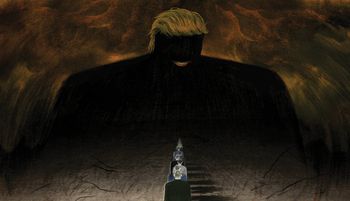Peter Wehner in The New York Times:
Peter Wehner (@Peter_Wehner), a senior fellow at the Ethics and Public Policy Center, served in the last three Republican administrations and is a contributing opinion writer.
 Mr. Trump knows his target audience, which explains why, beginning the morning of the Indiana primary on May 3 (the day he became the de facto nominee), he has — among other in-the-gutter moments — implied that Senator Ted Cruz’s father was implicated in the assassination of President Kennedy; insinuated that Vince Foster, a friend of the Clintons who was White House deputy counsel, was murdered (five official investigations determined that Mr. Foster committed suicide); engaged in a racially tinged attack on Gonzalo Curiel, a district court judge presiding over a fraud lawsuit against Trump University; and expressed doubt that a Muslim judge could remain neutral in the case. This is conspiratorial craziness and rank racism — and all of it has happened after we were told Mr. Trump would raise his game. The surprise is that so many Republicans are now expressing consternation at what Mr. Trump is doing. Has any recent presidential candidate ever advertised quite as openly as Mr. Trump the kind of vicious attacks he’d engage in? We were warned in neon lights what was coming. The idea that he will now engage in a “course correction” — that he will flip a switch and transform himself into a decent and dignified man — is laughable. Mr. Trump has repeatedly stated that he won’t change his approach. (“You win the pennant and now you’re in the World Series — you gonna change?”) In this one area, Republicans should take him at his word.
Mr. Trump knows his target audience, which explains why, beginning the morning of the Indiana primary on May 3 (the day he became the de facto nominee), he has — among other in-the-gutter moments — implied that Senator Ted Cruz’s father was implicated in the assassination of President Kennedy; insinuated that Vince Foster, a friend of the Clintons who was White House deputy counsel, was murdered (five official investigations determined that Mr. Foster committed suicide); engaged in a racially tinged attack on Gonzalo Curiel, a district court judge presiding over a fraud lawsuit against Trump University; and expressed doubt that a Muslim judge could remain neutral in the case. This is conspiratorial craziness and rank racism — and all of it has happened after we were told Mr. Trump would raise his game. The surprise is that so many Republicans are now expressing consternation at what Mr. Trump is doing. Has any recent presidential candidate ever advertised quite as openly as Mr. Trump the kind of vicious attacks he’d engage in? We were warned in neon lights what was coming. The idea that he will now engage in a “course correction” — that he will flip a switch and transform himself into a decent and dignified man — is laughable. Mr. Trump has repeatedly stated that he won’t change his approach. (“You win the pennant and now you’re in the World Series — you gonna change?”) In this one area, Republicans should take him at his word.
When a narcissist like Mr. Trump is victorious, as he was in the Republican primary, and when he has done it on his terms, he’s not going to listen to outside counsel from people who think they can change the patterns of a lifetime. Republicans have not changed Mr. Trump for the better; he has changed them for the worse. So here we are, with Republicans who lined up behind Mr. Trump now afraid of being led off a high cliff. If the prospect of a November shellacking isn’t enough to unnerve these Republicans, there’s also this to factor in: What we are talking about is potential generational damage to the Republican Party. Consider this historical comparison: In 1956 the Republican nominee, Dwight D. Eisenhower, won nearly 40 percent of the black vote. In 1960, Richard Nixon won nearly a third. Yet in 1964, in large part because of his opposition to the Civil Rights Act, Barry Goldwater (who was no racist) won only 6 percent. More than a half-century later, that figure has remained low. Mr. Trump — through his attacks against Hispanics that began the day he announced his candidacy — is doing with Hispanics today what Senator Goldwater did with black voters in the early 1960s. The less resistance there is to Mr. Trump now, the more political damage there will be later. The stain of Trump will last long after his campaign. His insults, cruelty and bigotry will sear themselves into the memory of Americans for a long time to come, especially those who are the targets of his invective.
Mr. Trump is what he is — a malicious, malignant figure on the American political landscape. But Republican primary voters, in selecting him to represent their party, and Republican leaders now rallying to his side, have made his moral offenses their own.
More here.
Andrew Martin at The Financial Times:
